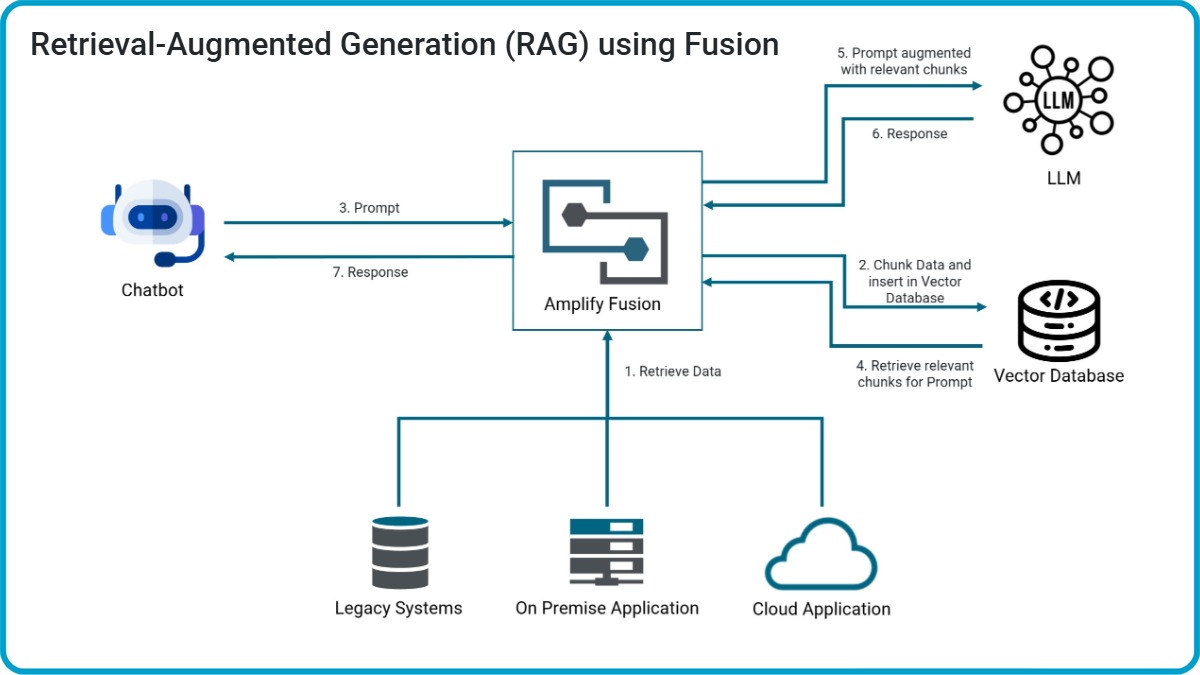In today’s rapidly evolving AI landscape, organizations are looking for ways to make large language models (LLMs) more accurate, reliable, and business-relevant. Retrieval-Augmented Generation (RAG) has emerged as a powerful framework that addresses these needs by combining the generative capabilities of LLMs with the precision of information retrieval systems.
In this article, I’d like to explore the fundamental principles behind RAG and demonstrate some of its tangible business value. We’ll also look at how Axway Amplify Fusion provides the essential building blocks to implement RAG effectively in enterprise environments.
By connecting your existing data sources to modern AI capabilities with Amplify Fusion, RAG creates a bridge between your organization’s knowledge assets and the transformative potential of generative AI.
What is Retrieval-Augmented Generation (RAG)?
In the world of artificial intelligence, LLMs are trained on a large set of data which is usually public and or licensed data and the LLM only considers data that is available on a specific date. An LLM is not trained on private or sensitive data or on data made available after that specific date.
Many companies have use cases for AI that need to incorporate their private data, and it should include the latest data. Enterprises can achieve this by implementing retrieval-augmented generation.
Retrieval-Augmented Generation (or RAG) is an AI framework that enhances language models by incorporating external knowledge retrieval into the generation process. It combines two key components:
- Retrieval – The model searches a knowledge base (e.g., documents, databases, or APIs) for relevant information.
- Augmented generation – The retrieved information is used to enhance the response generated by a large language model (LLM).
See also: Boosting Automation with Agentic AI: A New Era for Enterprises
What is the business value of retrieval-augmented generation?
The value of retrieval-augmented generation lies in its ability to significantly enhance the accuracy, relevance, and trustworthiness of AI-generated responses by integrating external knowledge retrieval. It improves the accuracy and reduces hallucinations by using relevant and up-to-date data from your company’s sources (e.g. databases, APIs or documentation).
RAG does not require retraining and uses real-time data, which delivers significant cost savings. The transparency of the responses is improved because responses are based on retrieved documents which allows users to verify the sources.
For example:
- Without RAG: “Your spending limit depends on your bank’s policies.” (Vague and unhelpful)
- With RAG: “Based on your latest transactions, you have spent $1,200 this month. Your remaining spending limit is $800 as per your bank’s updated policy on March 1, 2025.” (Precise and contextual)
What are the challenges with RAG?
The main challenges associated with RAG are:
- Integration with existing systems: many organizations’ data sources are in legacy systems, making them difficult to reach for modern LLMs.
- Data quality: the data that is used by the LLM needs to be correct, up-to-date, relevant to the query, and in a format that can be handled by the LLM.
- Security: enterprises must avoid leaking data that only users with the correct access rights should be able to access.
- Regulatory compliance: strict rules need to be applied to ensure that local and company regulations are applied. (for example, PII data should be obfuscated per GDPR).
How can you use Fusion to tackle RAG challenges?
Axway’s Amplify Fusion is a low-code or no-code integration platform that solves simple to complex enterprise integration use cases and patterns.
Primary use cases are application integration, data integration, and APIfication (getting apps to talk to each other via application programming interfaces). The solution is offered as a pure software-as-service (SaaS), hybrid or customer-managed deployment.
Learn more about Amplify Fusion
Fusion delivers the necessary building blocks to help you tackle the challenges around RAG:
Integration with existing systems
As a fully hybrid solution, Fusion can integrate with systems that are running both on-premises and in the cloud. A large set of application and system connectors can be used to connect to your systems and extract all your data.
Data quality
The powerful mapping engine can be used to transform your data to any format that is required by the LLM, cleanup the data, obfuscate any sensitive data and split the data in chunks that the LLM can process.
Security
All security mechanisms are in place to connect to your different systems over secure connections and with modern authentication technologies. Fusion also has an API management layer on which you can expose the services that you create and which you can use to control the access to these services.
Regulatory compliance
To abide by the different internal and external regulations, rules can be applied to the prompts so that only data that meet your requirements is provided to the end users.
The following shows an example diagram of a RAG implementation using Fusion.

- Retrieve Data: Fusion retrieves data from a wide range of data sources.
- Chunk Data and insert in Vector Database: Fusion curates the data and splits it in chunks which are inserted into a vector database.
- Prompt: A chatbot calls a secured API hosted on Fusion which does the orchestration of the different calls to the vector database and to the LLM
- Retrieve relevant chunks for prompt: Fusion retrieves relevant chunks from the vector database based on the context of the prompt.
- Prompt augmented with relevant chunks: Fusion calls the LLM with the prompt that is augmented with the relevant chunks
- Response: The response can be curated by Fusion to ensure no sensitive data is leaked.
- Response: Fusion sends the response back to the chatbot.
Leverage what you already have and innovate with Amplify Fusion
Implementing RAG represents a strategic opportunity for enterprises to leverage the power of generative AI while maintaining accuracy, compliance, and security.
Amplify Fusion helps your organization effectively address some of the challenges of integrating RAG into enterprise environments by providing a secure, flexible framework for connecting your valuable business data with modern LLMs.
Whether you’re looking to enhance customer experiences, improve internal knowledge management, or develop innovative AI applications, the combination of RAG principles and Amplify Fusion’s integration platform offers a practical path forward in your AI transformation journey.
Discover how to address enterprises challenges around application integration with Amplify Fusion

Follow us on social